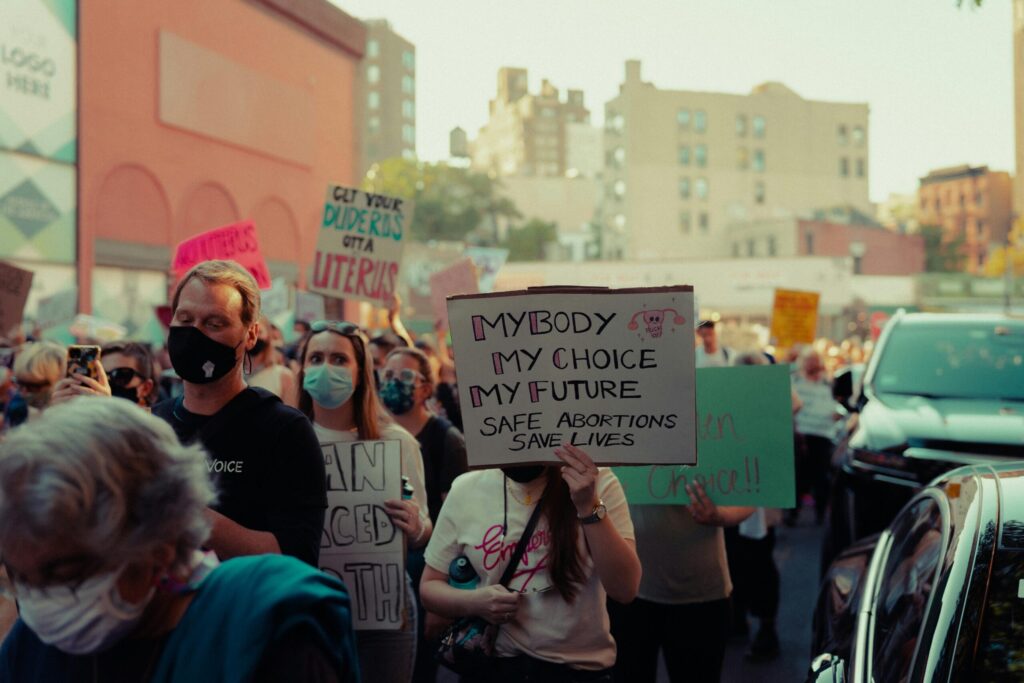
Former President Donald Trump is reportedly courting his conservative grassroots base through a partnership with a far-right Christian lobbying group that has extremist positions on abortion and gay marriage. The Danbury Institute, where Trump will speak online, has recently been in the news for calling abortion “child sacrifice” and pushing for an outright prohibition on abortion.
Trump Walking a Fine Line
This move by Trump is part of a long-standing strategy of walking a fine line between catering to the most ardent supporters of his agenda and reaching out to a more diverse electorate. For much of his political career, Trump has demonstrated pragmatic tactics on divisive issues to garner the most widespread support possible given the political realities he faces.
Regarding the issue of abortion specifically, Trump has been a proponent of allowing decisions to be made at the state level and has taken flack from both the left and the right on this issue. Although his nomination of Supreme Court justices that led to the demise of Roe v. Wade was a long-time goal of many in the pro-life movement, his hesitancy to back an outright national prohibition on abortion has left many of those same proponents less than thrilled. His remarks late last week, where he reaffirmed his position that abortion should be decided at the state level and refused to back a 15-week national restriction, prove this point.
Joe Biden’s presidential campaign was swift to denounce Trump’s partnership with the Danbury Institute, calling him a “proponent of abortion ban extremists.”

Abortion Politics Could Influence 2024 Race
Trump’s pragmatic yet measured stance on abortion clearly shows he understands the political pitfalls associated with the issue. Ever since Roe v. Wade fell in the last year of the Trump administration, access to abortion has been a prime target for Republican candidates in the elections that have followed. Trump’s strategy on this issue seems to be an effort to not completely turn off the moderates in the electorate who are personally pro-life but politically support abortion access in some form while not losing the support of those who are consistently pro-life.
Former Vice President Mike Pence has been outspoken in his criticism of Trump’s position, also pushing for a national 15-week abortion ban. Pence has said that a federal prohibition is needed to stop late-term abortions and to bring the U.S. in line with other Western countries that restrict abortion access more than the U.S. currently does. His public break with Trump on this issue points to a more extensive debate happening in the Republican Party about the best way to handle policy related to abortion.

When it comes to measuring public opinion on abortion, the polling shows that the issue has changed since Roe v. Wade was overturned. Support for some form of legal access to the procedure is increasing. A recent Fox News poll showed that support for abortion being legal in all or most cases is now rising sharply among key voting groups, including older Americans, self-identified conservatives, registered Republicans and white evangelical Christians. This change in opinion explains some of the political plight Trump and the GOP face in determining a stance on this issue that will appeal to the broadest segment of the electorate.
Trump’s larger strategy around extremist organizations
This event at the Danbury Institute is part of Trump’s larger strategy to activate his conservative Republican base as he looks ahead to the 2024 election. Throughout his political tenure, Trump has often appeared at events with extremist organizations and has actively sought their support to consolidate his power in the Republican Party.
The Institute’s extremist ideology around abortion and LGBTQ+ rights is music to the ears of a faction of Trump’s base that sees these issues as paramount. However, it also poses a risk to moderates and independent voters who may see the positions as extremist. The Institute’s language around abortion as “child sacrifice” and its stance against LGBTQ+ rights is likely to further divide the public and make it more difficult for Trump to assemble a diverse and robust coalition of support.

Divisions in the Republican Party
Trump’s stance on abortion has also come under sharp attack from Democrats. Still, the stance has also exposed divisions in the Republican Party. Mike Pence, the former Vice President, has publicly rebuked Trump for refusing to support a national abortion ban, which he called a surrender to the pro-life movement. Pence says the U.S. should have a federal limit of 15 weeks on abortion, which would bring the country in line with many countries in Europe. He says protections for the unborn require a national abortion ban.
Pence’s view represents a powerful wing of the Republican Party that wants a much more forceful stance taken to restrict abortion. He says the majority of Americans agree that there should be some restriction on abortion and that a national limitation should be the standard to protect the unborn. This camp in the GOP sees leaving the abortion issue up to the states as a recipe for haphazard and inadequate protections for the unborn.
The Danbury Institute on other issues
Abortion is not the only issue the Danbury Institute focuses on, but it is the most prominent. The group wants a government that returns to “traditional Christian values and principles.” On the issue of same-sex marriage and LGBTQ+ rights, the Institute says the practices and policies of America’s opposition to these rights are “clearly contrary to the Bible.
The Institute’s opposition to these issues is based on reading Christian scripture, which should form the basis of public policy. It holds to a belief that the Bible, in its view, the inerrant Word of God, clearly addresses issues of life, family and morality that should form the basis of public policy. From this theological vantage point, the Institute actively lobbies lawmakers and policymakers on matters to restrict abortion, oppose same-sex marriage and prohibit recognition of diverse gender identities.
Their website claims to “envision a society governed by the principles of Christianity, with laws based upon ‘their’ understanding of the Bible.” The Institute promotes “religious liberty, now threatened by secularist and progressive forces.” Their vision “is to restore the ills of a world that has veered away from traditional values and standards.”
Media Coverage and Public Response
Media coverage and public response to Trump’s announced appearance at the Danbury Institute event has been intense. His detractors have widely chastised the former President for associating with an extreme, radical organization regarding abortion and LGBTQ+ rights. They claim Trump is pandering to the extreme right wing of his political party, pleasing his most conservative supporters and disregarding the majority of the public.
Trump’s supporters have applauded the 45th President for his openness to meet with organizations that promote conservative values. They claim his appearance at the Danbury Institute event shows a genuine commitment to the pro-life movement and recognizing threats to religious liberty. Trump’s association with the Danbury Institute reaffirms his conservative values to his supporters.
Media reports also discuss the political ramifications of the 2024 presidential election should Trump decide to run again. Political analysts point to the ongoing tension between catering to the conservative base and needing to win a general election with a more centrist voter base. While Trump’s association with the Institute may increase his pro-life and religious voter support, it could have a detrimental impact on winning moderates and independents, who may find the Institute’s views to be outside the mainstream.
The Future of Abortion in America
The future of abortion in America will likely continue to be a dominant public policy issue in the run-up to the 2024 presidential election. With the demise of Roe v. Wade, the debate and decision-making regarding abortion policy is now in the states. Abortion regulations vary significantly throughout the United States, demonstrating the divide in American society regarding abortion.

Trump’s stance on abortion policy, supporting state decisions, represents the principle of federalism – the division of powers between federal and state governments. However, this position also demonstrates the difficulties in establishing a national standard regarding abortion. The question regarding a universal abortion stance triggers intense debate and division. The 15-week standard proposed by some represents a possible national standard, causing tension between factions of the pro-life movement and the Republican Party.





